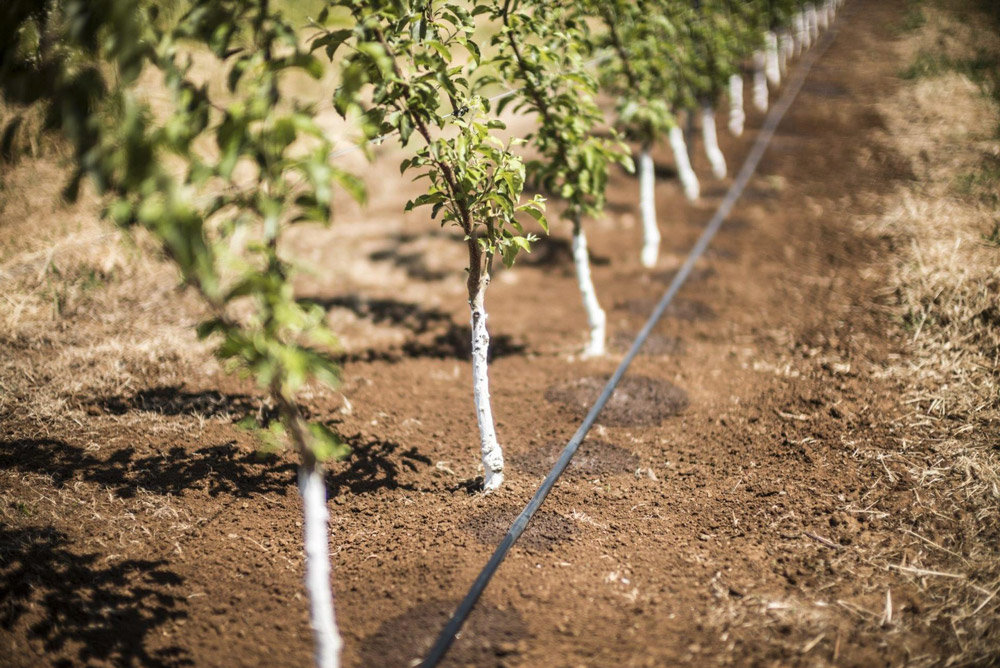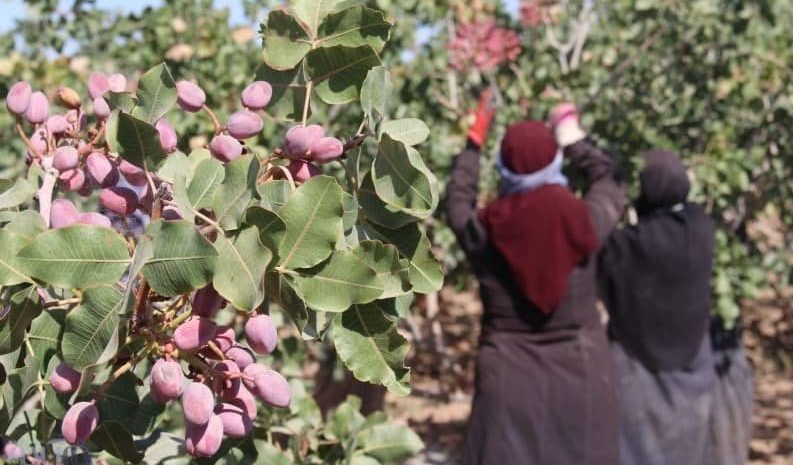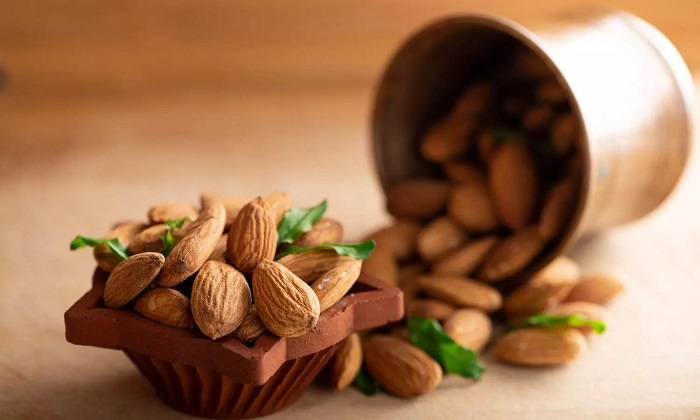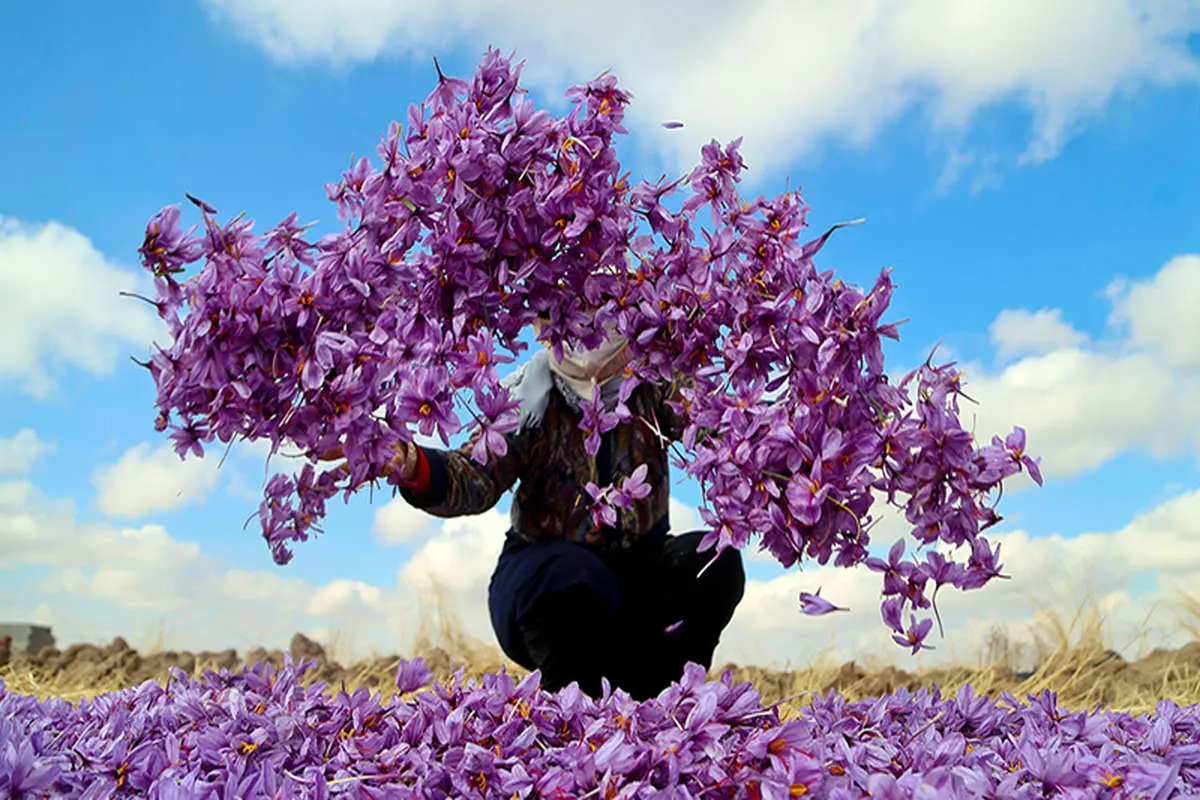
Understanding the Growing and Harvesting of Iranian Saffron

The Importance of Organic Certification for Iranian Products
Adopting Eco-Friendly Techniques
Iran is one of the world’s leading producers of nuts and dried fruits, such as pistachios, almonds, walnuts, raisins, figs, and dates. With growing international demand, Iran is increasingly focused on adopting sustainable farming practices to ensure that its agriculture remains productive, environmentally friendly, and resilient in the face of challenges like climate change and water scarcity.
Here’s a look at how Iran is implementing eco-friendly farming techniques to support the sustainable production of nuts and dried fruits, ensuring the long-term health of its agricultural landscapes and communities.
1. Water Conservation Techniques
Water scarcity is one of the most critical challenges facing agriculture in Iran, especially in regions where pistachios, almonds, and other nuts are grown. Traditional irrigation methods can waste water and lead to salinization of the soil, so Iran is increasingly turning to more efficient water management practices.
Key Water Conservation Practices:
- Drip Irrigation: Drip irrigation systems deliver water directly to the roots of crops, significantly reducing water waste through evaporation or runoff. This method is particularly effective in pistachio and almond orchards, where water use is critical.
- Rainwater Harvesting: Some regions are adopting rainwater harvesting systems to capture and store water during the rainy season, which can then be used for irrigation during drier months.
- Aquifer Recharging: In areas where water tables are depleting, Iranian farmers are using aquifer recharging techniques, which involve diverting excess water during the rainy season into underground aquifers to replenish groundwater reserves.
- Precision Agriculture: By using satellite imagery and sensors, farmers can monitor soil moisture levels and weather patterns, ensuring that water is applied efficiently and only when necessary.
Benefits:
- Reduced Water Use: Drip irrigation and other modern techniques can reduce water consumption by up to 50%, making it a vital practice in drought-prone areas.
- Improved Crop Yields: More efficient irrigation leads to healthier crops and increased yields, which is essential for maintaining the profitability of nut and dried fruit farms.
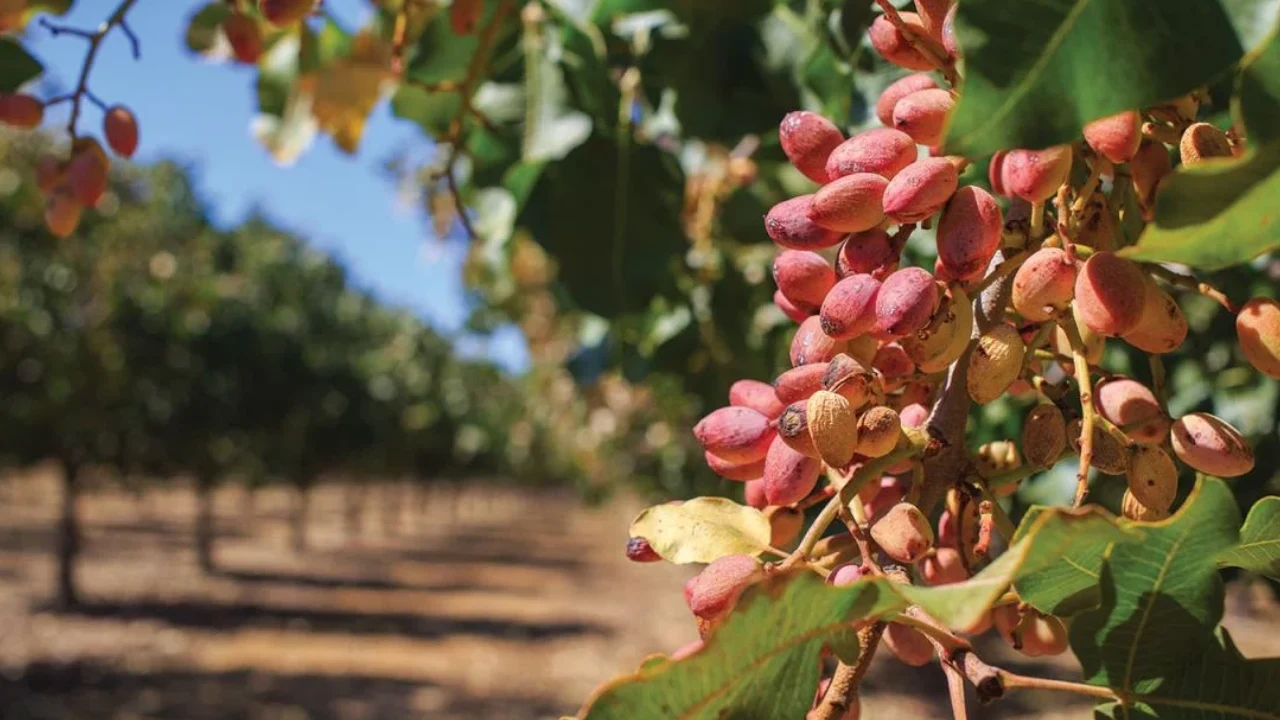
Pistachio Drip Irrigation
2. Organic Farming and Reduced Pesticide Use
With growing awareness of the environmental and health impacts of synthetic pesticides and fertilizers, many Iranian farmers are transitioning to organic farming practices, especially for pistachios, figs, and dates. Organic farming focuses on improving soil health and reducing reliance on chemical inputs, resulting in more sustainable and resilient ecosystems.
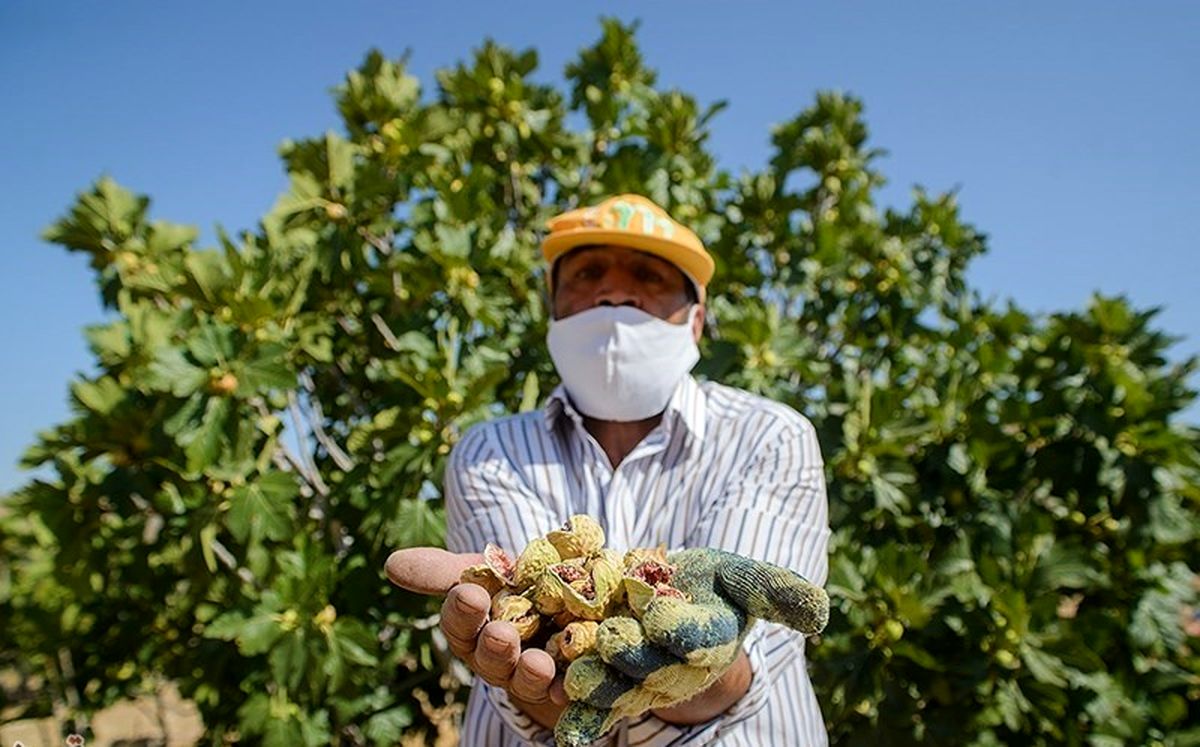
Estahban fig farms
Organic Farming Techniques:
- Natural Pest Control: Farmers are increasingly using biological pest control methods, such as introducing beneficial insects like ladybugs or using natural predators to control pests. This reduces the need for chemical pesticides and promotes a healthier farm ecosystem.
- Composting and Natural Fertilizers: To improve soil fertility, farmers are turning to composting and organic fertilizers, which return nutrients to the soil naturally. This method reduces the need for synthetic fertilizers and enhances soil health over time.
- Crop Rotation: Rotating crops helps break pest and disease cycles while improving soil health. By planting different crops, such as legumes, alongside nut trees, farmers can naturally fix nitrogen in the soil, reducing the need for chemical fertilizers.
Benefits:
- Healthier Ecosystems: Organic farming reduces soil contamination, protects pollinators, and enhances biodiversity on farms.
- Premium Pricing: Organic nuts and dried fruits often command higher prices in both domestic and international markets, providing farmers with an economic incentive to adopt sustainable practices.
3. Agroforestry and Diversified Farming Systems
Agroforestry, which combines the cultivation of trees with crops or livestock, is becoming an increasingly popular practice in Iran. This system can improve biodiversity, enhance soil fertility, and create a more resilient and sustainable farming environment, particularly for nut and dried fruit production.
Agroforestry Practices:
- Intercropping: In pistachio and almond orchards, farmers are beginning to plant herbs, legumes, or cover crops between the rows of trees. This helps improve soil health, reduce erosion, and provide additional sources of income through the sale of these secondary crops.
- Silvopasture: Some farms are integrating livestock grazing into their orchards. Animals such as goats and sheep graze on cover crops or natural vegetation, reducing the need for mechanical weeding and providing natural fertilizer in the form of manure.
- Biodiverse Orchards: By planting a diverse range of tree species alongside pistachio or almond trees, farmers can promote greater biodiversity, which helps control pests and diseases naturally.
Benefits:
- Improved Soil Health: The roots of multiple plant species improve soil structure and fertility, reducing the need for chemical inputs.
- Enhanced Resilience: A diversified farming system is more resilient to climate change and market fluctuations, providing farmers with a wider range of products to sell and reducing risk.
4. Soil Conservation and Erosion Control
Soil erosion is a major issue in many farming regions of Iran, especially in areas with steep terrain or intensive cultivation. To protect the valuable topsoil and improve long-term sustainability, Iranian farmers are adopting soil conservation practices to ensure the fertility of their land remains intact.
Soil Conservation Practices:
- Terracing: In hilly or mountainous regions where nuts like walnuts and hazelnuts are grown, terracing helps reduce soil erosion by creating flat surfaces for farming, which slows down water runoff and minimizes soil loss.
- Mulching: Farmers are using organic mulches like straw or plant residues to cover the soil and reduce evaporation, protect against erosion, and suppress weed growth.
- No-Till Farming: By minimizing soil disturbance, no-till farming helps maintain soil structure, increase organic matter, and prevent erosion. This technique is particularly useful in almond and pistachio orchards.
Benefits:
- Reduced Erosion: Terracing and mulching prevent the loss of valuable topsoil, which is essential for maintaining high yields in nut and dried fruit production.
- Better Water Retention: Mulching and no-till farming improve the soil’s ability to retain moisture, reducing the need for frequent irrigation.
5. Renewable Energy and Eco-Friendly Processing
Iran’s commitment to sustainable farming practices also extends to the processing and packaging stages of nut and dried fruit production. Many producers are beginning to adopt renewable energy sources and eco-friendly processing techniques to reduce the environmental impact of their operations.
Sustainable Processing Initiatives:
- Solar-Powered Drying: In regions where dried fruits like dates, figs, and raisins are produced, farmers are using solar energy to power drying facilities. This reduces reliance on fossil fuels and decreases greenhouse gas emissions.
- Biodegradable Packaging: Some producers are switching to biodegradable or recyclable packaging materials for nuts and dried fruits, helping to reduce plastic waste and appeal to eco-conscious consumers.
- Energy-Efficient Machinery: Processing facilities are investing in more energy-efficient machinery to reduce the carbon footprint associated with shelling, drying, and packaging nuts.
Benefits:
- Lower Carbon Footprint: Using renewable energy in the processing stages reduces greenhouse gas emissions, contributing to a more sustainable supply chain.
- Sustainable Packaging: Biodegradable packaging reduces waste and appeals to environmentally conscious consumers in both domestic and international markets.
6. Farmer Education and Government Support
The adoption of sustainable farming practices in Iran is being accelerated by government initiatives, farmer education programs, and international collaborations. These efforts are aimed at raising awareness about the benefits of eco-friendly farming and providing farmers with the tools they need to implement these practices successfully.
Key Initiatives:
- Training Programs: Local governments and agricultural organizations provide training on water management, organic farming, and sustainable practices, helping farmers modernize their operations while reducing their environmental impact.
- Subsidies and Grants: The Iranian government offers subsidies and financial incentives to encourage farmers to adopt water-efficient technologies and organic farming methods.
- International Collaborations: Iran is working with international organizations and experts to share best practices in sustainable farming and adopt cutting-edge technologies for its nut and dried fruit industries.
Benefits:
- Increased Knowledge: Farmers are equipped with the latest techniques and technologies to improve their sustainability practices, leading to more environmentally friendly farming operations.
- Government Support: Financial incentives make it easier for farmers to invest in sustainable technologies, such as drip irrigation systems or solar-powered processing facilities.
Conclusion
Iran’s sustainable farming practices for nuts and dried fruits are paving the way for a more environmentally responsible agricultural sector. Through water conservation, organic farming, agroforestry, and renewable energy, Iran is addressing the challenges posed by climate change and resource scarcity while maintaining its position as a global leader in nut and dried fruit production. These eco-friendly initiatives not only help preserve the country’s rich agricultural heritage but also ensure that future generations can continue to enjoy the high-quality pistachios, almonds, walnuts, and dried fruits that Iran is famous for.

